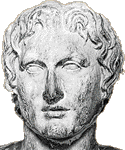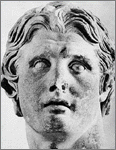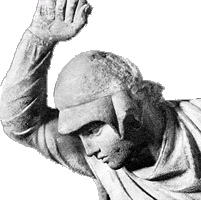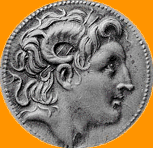|
356 - 323 B.C.E. |
 |
|
|
|
|
 
|

|
How do we know Alexander was gay? 2,300 years ago men in Greece had wives, mistresses, and lovers of either gender. Alexander's father, Philip of Macedon, had male lovers and also many wives, a problem when half-brothers would fight to the death over the throne. Alexander refused to marry and beget an heir when he left Macedon to conquer the world. Alexander loved his boyhood friend, Hephaestion. Both brilliant boys, they were tutored by Aristotle, with whom Hephaestion kept up a lifelong correspondence. Alexander and Hephaestion felt like the two heroes Achilles and Patroclus, from The Iliad, which was Alexander's favorite book. Hephaestion started off as a regular cavalry soldier - Alexander did not play favorites - and rose through the ranks on merit and carried out the most important military and administrative assignments. Later, Alexander also fell in love with a courtier from the conquered Persian court, scandalous not because the courtier was male, but because he was Persian -- most Greeks thought that other people were barbarians. Alexander married a princess from a faraway mountain kingdom of Asia, but it's unclear if he loved her because their only child was born much later. He also married the defeated Persian king's daughter, a purely political marriage, and Hephaestion married her sister, since he and Alexander wanted their children to be cousins. After they conquered Asia, Hephaestion died suddenly of typhus. Alexander's grief was monumental. He asked the oracles if Hephaestion was a god (back then people could become gods by achievement) and was told that Hephaestion was indeed a hero, a lesser type of god. Now Alexander, who had no doubt about his own divinity, knew that he would meet his beloved again in the Blessed Realm, where gods and heroes live. He got his first wife pregnant and died himself without waiting for the child to be born, all within eight months of Hephaestion's death, just as Achilles had followed Patroclus in the Iliad. He was 32 years old.
Paul Cartledge is Professor
of Greek History in the University of Cambridge,
and Fellow of Clare College, Cambridge. The
following is from an article he wrote just before
publication of his book, Alexander the Great:
The Hunt for a New Past (2004). The question of
Alexander's sexuality--his predominant sexual
orientation--has enlivened, or bedevilled, much
Alexander scholarship. That he loved at least
two men there can be little doubt. The first was
the Macedonian noble Hephaestion, a friend from
boyhood, whom he looked on--and may actually
have referred to--as his alter ego. The Persian
queen mother, it was said, once mistook the
taller Hephaestion for Alexander, who graciously
excused her blushes by murmuring that 'he too is
Alexander'. Whether Alexander's relationship
with the slightly older Hephaestion was ever of
the sort that once dared not speak its name is
not certain, but it is likely enough that it
was. At any rate, Macedonian and Greek mores
would have favoured an actively sexual component
rather than inhibiting or censoring it. Like
hunting, homosexuality was thought to foster
masculine, especially martial,
bravery. The other non-female
beloved of Alexander's was named Bagoas. He was
not just a 'barbarian' (Persian) but also a
eunuch. There was a long Middle Eastern
tradition of employing eunuchs as court
officials, especially where a harem system was
in place, as at the Achaemenid royal court
(witness the Biblical book of Esther). Bagoas
was not the first Persian court eunuch, either,
to act as a power-broker between rival
individuals and factions. A homonymous
predecessor had done his murderous worst through
the arts of poison, paving the way for Darius
III's immediate predecessor to assume the
Persian throne. The methods of Alexander's
Bagoas were no less effective, if less violent,
and Alexander's personal commitment to him seems
to have attained levels of sexual intimacy that
his Greek and Macedonian courtiers found
embarrassing. |
|
We can't just expect historians from the past to come right out and say that Alexander was gay -- you'd be considered unprofessional, a crackpot gossip. It was just not done. So they had to find other ways to express it. Here's a perfect example, a guy from Victorian England. Read what he says about Alexander and decide for yourself. After you wade through all the dense Victorian verbiage, do you think he thinks Alexander was gay? David George
Hogarth (1862-1927) About Alexander, Hogarth writes, "...his nature was neither cold nor passionless. The flame burned fiercely enough in Alexander, little issue though it found in the love of women." About Hephaistion: "Was there not in Alexander's life at least one emotional friendship, a friendship of that type which, based obscurely on passion, in certain natures passes the love of women?" About Alexander's response to Hephaistion's death: "...at Ecbatana there fell upon him a stunning blow, the loss of Hephaistion. It followed close on the second treason and final flight of another of the few intimates of his boyhood, Harpalus,...And now Hephaistion too was gone, the congenial enthusiastic nature which had been so much more to Alexander than Ptolemy's sagacity or Nearchus' careful courage, the friend, more than a friend, and closer than a brother, who alone awoke a gentler emotion in the breast of the lonely Conqueror. For there come, alike in discouragement and exaltation, to all men, however strong of body or brain, moments of craving, in which the soul gropes blindly for another soul; and the most strong, if he owns this need most rarely, feels it most imperious. The blood of Olympias ran hotly in the veins of her son beneath that crust with which ambition and its fulfillment had overlaid him. In all things passionate, he passionately craved sympathy, and all the masterful yearnings of his soul had been satisfied first and only by Hephaistion. The rest of the world had dwindled beneath his feet; and lo! now in a moment he was left in such a solitude as had seldom been the doom even of kings. All the savage in Alexander was unchained: he passed from paroxysm to paroxysm of emotion, at one moment abased in utter despair, at another seeking to fulfil his soul in strenuous cruelty. The last resources of extravagance were exhausted in sending the dear ghost worthily to the world below, and such a monument arose as only kings can raise to the one human being with whom they have been able to lay aside the king." David George Hogarth, Philip and Alexander of Macedon: Two Essays in Biography (New York: Books For Libraries Press, 1971), 162-163, 266-267. (First pub. 1897 by C. Scribner Sons, New York.) |
|
|
![]()

In this mosaic from
Pompeii, which is a copy of a Greek painting, Alexander
(left) fights the Persian Emperor Darius III at the battle
of Issus. As a general, Alexander is
among the greatest the world has ever known. He
commanded from the front, leading the cavalry side
by side with Hephaestion (since Alexander was a
lefty they must have been hell on wheels together
in battle). Alexander was wounded by every weapon
of war known at the time. He even jumped down alone
into an enemy citadel and fought until he could be
rescued -- taking an arrow in his chest for his
trouble. These traits inspired love and
|

|
and below with the horns of the god Ammon. |
|
 |
What can
we learn You can
die young, and yet |
 I recommend it! CLICK HERE to read the scoop. There's a new novel
about Alexander coming out; |
|
Want more? Here's a link to a page on Alexander's sexuality on a comprehensive Alexander the Great web site: Alexander the Great on the Web is the preeminent website on Alexander the Great in history and culture. It sorts and describes some 1,000 online resources, from biographies to movies, academic papers to political arguments. |
|
|
|
||||
| GayHeroes.com uses a third-party advertising company (Google Adsense) to serve ads when you visit our website. This company may use information (not including your name, address, email address, or telephone number) about your visits to this and other websites in order to provide advertisements about goods and services of interest to you. If you would like more information about this practice and to know your choices about not having this information used by Google Adsense, click here. |
 Alexander
sacked cities,
killed rivals, and sold
people into slavery, but aside from that he was a really
great guy. But seriously folks, two thousand years ago
people were, well, pagans. The peaceful Christian
philosophies of our millenium (which has seen the
Inquisition, Hiroshima and Auschwitz) were not known. By
this measure, Alexander was truly enlightened for his time,
shocking his contemporaries by treating foreigners
(especially women) with respect, restoring former rulers,
governments, and religions which the Persians had
suppressed, and even giving them high positions in his
Empire. He was exceptionally generous, sharing all the
treasures of his conquests with his troops. He made some
horrible mistakes, including killing an old family friend in
a drunken brawl, but he was deeply religious, and truly
believed that by exceeding the feats of the gods (like
Hercules) he could become a god himself. He was the first to
seriously envision all people as God's children.
Alexander
sacked cities,
killed rivals, and sold
people into slavery, but aside from that he was a really
great guy. But seriously folks, two thousand years ago
people were, well, pagans. The peaceful Christian
philosophies of our millenium (which has seen the
Inquisition, Hiroshima and Auschwitz) were not known. By
this measure, Alexander was truly enlightened for his time,
shocking his contemporaries by treating foreigners
(especially women) with respect, restoring former rulers,
governments, and religions which the Persians had
suppressed, and even giving them high positions in his
Empire. He was exceptionally generous, sharing all the
treasures of his conquests with his troops. He made some
horrible mistakes, including killing an old family friend in
a drunken brawl, but he was deeply religious, and truly
believed that by exceeding the feats of the gods (like
Hercules) he could become a god himself. He was the first to
seriously envision all people as God's children.

